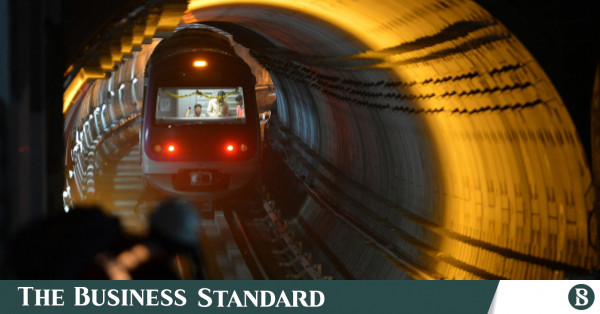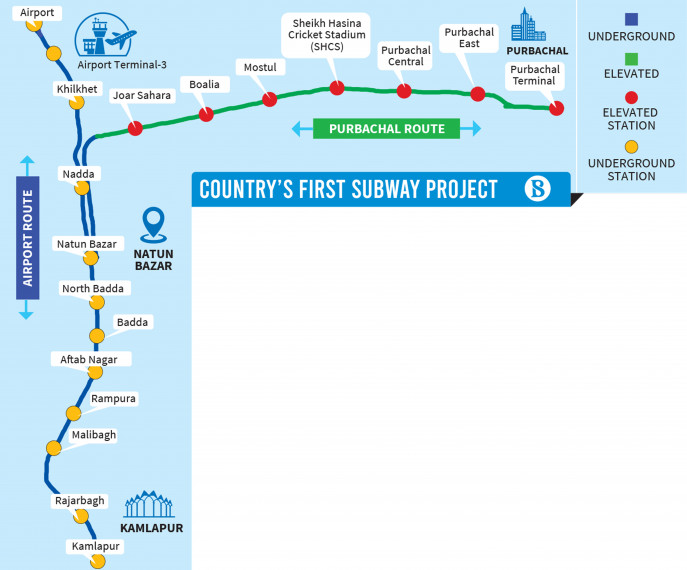Black_cats
ELITE MEMBER

- Joined
- Dec 31, 2010
- Messages
- 10,031
- Reaction score
- -5
Dhaka’s first underground metro work begins in December
23 October, 2022, 12:15 pm
Last modified: 23 October, 2022, 11:19 pm

 www.tbsnews.net
www.tbsnews.net

Infographic: TBS
The Dhaka Mass Rapid Transit Company Ltd on Sunday signed a deal with an eight-company consortium to supervise the construction of the country's first underground metro rail, which will begin December this year.
As per the deal, the consortium led by Japanese Nippon Koei Co Limited will be supervising the construction of the 31.24 km underground rail project – or MRT Line-1 – in the capital.
The consortium includes Oriental Consultants Global, SYSTRA SA, Delhi Metro Rail Corporation Limited, Nippon Koei India Private Limited, Katahira and Engineers International, Development Design Consultants Limited and Nippon Koei Bangladesh Limited.
MAN Siddique, managing director of the Dhaka Mass Rapid Transit Company, and Naoki Kudo, managing director of Nippon Koei Bangladesh Ltd, signed the agreement on behalf of their respective sides.
As the chief guest of the programme, Road Transport and Bridges Minister Obaidul Quader said the next goal of the government is to build a smarter Bangladesh, which requires a smart transportation system.
With the 2028 deadline, the cost of the underground metro project has been estimated at Tk52,561 crore.
The MRT Line-1 will have two parts – a 19.87km part from Hazrat Shahjalal International Airport to Kamalapur (Airport route) which will be underground and an around 11.37km elevated line from Natun Bazar to Purbachal (Purbachal route).
"The government is progressing well to establish the network," noting so, Quader said that a total of six metro rail routes will be developed in the capital by 2030.
The Dhaka Mass Rapid Transit Company, the implementing agency of the underground metro rail, is now implementing the MRT-6 or Uttara-Motijheel metro rail works.
The company is going to begin the underground metro works by starting the underground rail depot construction in Purbachal in December – even before completing the ongoing Uttara-Motijheel metro rail project by December 2023.
The Executive Committee of the National Economic Council (Ecnec) approved the MRT line-1 project at Tk52,561 crore in 2019. Of the amount, the government will provide Tk13,111 crore and Japan Tk39,450 crore.
However, the construction faced multiple delays after the Ecnec approval thanks to Covid pandemic.
At the deal signing event, the officials said underground metro construction will be implemented dividing all project components into 12 packages.
After signing the consultancy contract in November, the first package, which comprises land development of deport areas, will begin in early-December this year.
The line will have 21 stations – 12 underground and nine elevated. Besides, 25 sets of trains having eight coaches each will operate daily on the line. The maximum capacity of a train will be 3,088 persons.
According to the officials, it will take only 34 minutes to commute from Dhaka airport to Kamalapur, 20 minutes from Natun Bazar to Purbachal, and 35 minutes from Kamalapur to Purbachal.
The trains will be controlled remotely from the "Operation Control Center". Elevators, stairs and escalators will be installed in underground and alleviated stations for the passengers to access rail platforms easily.
According to officials, around 8 lakh passengers will be able to travel every day by the underground metro after the inauguration in 2028. With all the six metro rails in operation by 2030, more than 50 lakh passengers will be able to commute daily using the modern transport system.
At the deal signing programme, Dhaka Mass Rapid Transit Company Managing Director thanked Japan International Cooperation Agency (Jica) for financing three metro rail projects and asked for further support to conduct the feasibility study of MRT line-2 and MRT line-4 to connect Dhaka with Narayangonj through metro rail.
Japanese Ambassador to Bangladesh Ito Naoki said the contract signing ceremony is a milestone for Bangladesh's infrastructural development.
He said the project will help save commuting time in Dhaka and protect the environment of the capital.
Ichiguchi Tomohide, chief representative of Jica Bangladesh Office, was also present at the programme.
INFRASTRUCTURE
TBS Report23 October, 2022, 12:15 pm
Last modified: 23 October, 2022, 11:19 pm

Dhaka’s first underground metro work begins in December
Japanese firm-led consortium will oversee the construction of the 31km Airport-Kamalapur-Purbachal metro line slated to be completed by 2028
Japanese firm-led consortium will oversee the construction of the 31km Airport-Kamalapur-Purbachal metro line slated to be completed by 2028
Infographic: TBS
Infographic: TBS
The Dhaka Mass Rapid Transit Company Ltd on Sunday signed a deal with an eight-company consortium to supervise the construction of the country's first underground metro rail, which will begin December this year.
As per the deal, the consortium led by Japanese Nippon Koei Co Limited will be supervising the construction of the 31.24 km underground rail project – or MRT Line-1 – in the capital.
The consortium includes Oriental Consultants Global, SYSTRA SA, Delhi Metro Rail Corporation Limited, Nippon Koei India Private Limited, Katahira and Engineers International, Development Design Consultants Limited and Nippon Koei Bangladesh Limited.
MAN Siddique, managing director of the Dhaka Mass Rapid Transit Company, and Naoki Kudo, managing director of Nippon Koei Bangladesh Ltd, signed the agreement on behalf of their respective sides.
As the chief guest of the programme, Road Transport and Bridges Minister Obaidul Quader said the next goal of the government is to build a smarter Bangladesh, which requires a smart transportation system.
With the 2028 deadline, the cost of the underground metro project has been estimated at Tk52,561 crore.
The MRT Line-1 will have two parts – a 19.87km part from Hazrat Shahjalal International Airport to Kamalapur (Airport route) which will be underground and an around 11.37km elevated line from Natun Bazar to Purbachal (Purbachal route).
"The government is progressing well to establish the network," noting so, Quader said that a total of six metro rail routes will be developed in the capital by 2030.
The Dhaka Mass Rapid Transit Company, the implementing agency of the underground metro rail, is now implementing the MRT-6 or Uttara-Motijheel metro rail works.
The company is going to begin the underground metro works by starting the underground rail depot construction in Purbachal in December – even before completing the ongoing Uttara-Motijheel metro rail project by December 2023.
The Executive Committee of the National Economic Council (Ecnec) approved the MRT line-1 project at Tk52,561 crore in 2019. Of the amount, the government will provide Tk13,111 crore and Japan Tk39,450 crore.
However, the construction faced multiple delays after the Ecnec approval thanks to Covid pandemic.
At the deal signing event, the officials said underground metro construction will be implemented dividing all project components into 12 packages.
After signing the consultancy contract in November, the first package, which comprises land development of deport areas, will begin in early-December this year.
The line will have 21 stations – 12 underground and nine elevated. Besides, 25 sets of trains having eight coaches each will operate daily on the line. The maximum capacity of a train will be 3,088 persons.
According to the officials, it will take only 34 minutes to commute from Dhaka airport to Kamalapur, 20 minutes from Natun Bazar to Purbachal, and 35 minutes from Kamalapur to Purbachal.
The trains will be controlled remotely from the "Operation Control Center". Elevators, stairs and escalators will be installed in underground and alleviated stations for the passengers to access rail platforms easily.
According to officials, around 8 lakh passengers will be able to travel every day by the underground metro after the inauguration in 2028. With all the six metro rails in operation by 2030, more than 50 lakh passengers will be able to commute daily using the modern transport system.
At the deal signing programme, Dhaka Mass Rapid Transit Company Managing Director thanked Japan International Cooperation Agency (Jica) for financing three metro rail projects and asked for further support to conduct the feasibility study of MRT line-2 and MRT line-4 to connect Dhaka with Narayangonj through metro rail.
Japanese Ambassador to Bangladesh Ito Naoki said the contract signing ceremony is a milestone for Bangladesh's infrastructural development.
He said the project will help save commuting time in Dhaka and protect the environment of the capital.
Ichiguchi Tomohide, chief representative of Jica Bangladesh Office, was also present at the programme.




